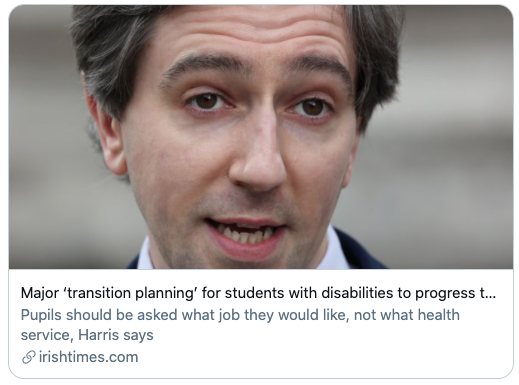Published in the Irish Times 20th May 2021. Marie O'Halloran
Minister for Further and Higher Education Simon Harris has announced as a “major priority” transition planning for students with learning disabilities to move into further education and employment.
The project, to be completed by September, will also include a “mapping exercise” of existing facilities and examples of good practice for further and higher education.
A national access plan for students into further education after secondary school is also under way.
Mr Harris said in the Dáil that too often the “discussion is too narrow” for pupils with disabilities when they leave school.
“It’s around what health service are we going to provide somebody with post-school, not what would this person like to do, what skill would they like, what job would they like, what college would they like to go to,” he said.
“We’re narrowing the conversation and almost sometimes suggesting their educational journey must end when they leave school.”
He had met Down Syndrome Ireland and parents “who said that in some cases not only are they not seeing their child progress when they leave school but actually seeing their children regress”, Mr Harris said. “What a horrific thing for a parent to have to say.”
He stressed that there would be “transition planning, a mapping out of what is there and then a scaling up of it”.
Mr Harris told Fianna Fáil TD Michael Moynihan that he would work with Ministers of State Josepha Madigan and Anne Rabbitte to develop the transition planning which will be presented to the Cabinet sub-committee in September.
The Minister said there were “some really good examples of good practice out there” including the Trinity Centre for People with Intellectual Disabilities.
“They’re taking students in with intellectual disabilities, straight from school and getting them into Trinity College,” from where they leave with an award and are linked with employment.
He also cited the National Learning Network in his Wicklow constituency which runs a number of programmes through its Rehab groups.
Rural access
Mr Moynihan said it was important to have development and a pathway for people right throughout the regions, pointing out that the Trinity access programme was centralised in urban area.
“You need to assess the needs in the community and how many people are falling through the cracks, because the system isn’t built enough to integrate them, to encourage them and to ensure that they can go on to education to the best of their ability.”
The Cork North-West TD also urged the Minister to “look at those who have been left behind heretofore as well as those into the future” to see if they can be rehabilitated.
Mr Harris said that while he cited Trinity College, there were similar programmes in other colleges, adding: “Why not in every other university across the country?
“We will use the education and training boards, colleges of further education, the higher education institutions. We’ll engage with disability stakeholders, we’ll link with the Department of Education. This transition planning is absolutely crucial.
“And we will get this done because this is a major, major priority for me, for my Department and for Government as a whole, and we’ll feed it into the development of the new national access projects.”
Mr Harris said they were “out to consultation” at the moment. He said that while they were hitting targets, he believed that was because the targets were set too low.
He added that he did not believe they were measuring enough types of disability.



Recent Comments